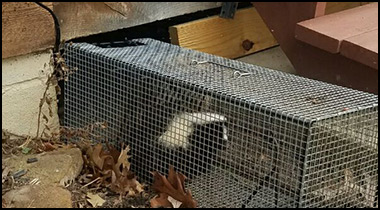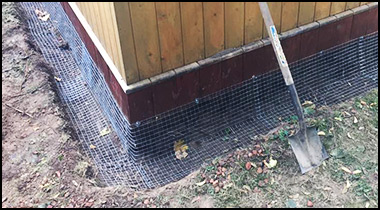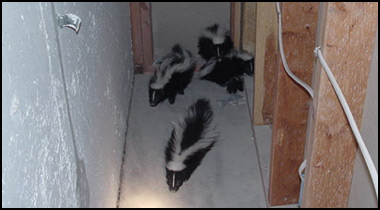Charleston Skunk Removal Resources
Skunk Rehabber - Southeastern Wildlife Exposition: (843) 723-1748
Free Charleston County Animal Services: (843) 554-4700
Humane Wildlife Trappers of Charleston: 843-325-2666
If you need skunk control in Charleston, you have a few options. First, you can attempt to solve the skunk problem yourself by reading our do-it-yourself guide. If you need outside help, you can also call Charleston County Animal Services to see if they have any free resources or help for you - however, they primarily deal with dog and cat concerns. You can also call a local Charleston wildlife rehabber, as they are typically a great resource for advice that is in the best welfare of the animal. If as a last resort you must hire a professional company, we recommend Humane Wildlife Trappers of Charleston at 843-325-2666. To learn more about them or check their skunk removal prices, visit charlestonpestanimal.com.

Charleston Skunk Trapping and Removal

Preventative Repairs & Exclusion

Charleston Skunk Removal From Structures
In many cases, preventative measures can solve your Charleston skunk problem - keep garbage secured, pet food indoors, and most of all when it comes to skunks, secure the perimeter of your shed, porch, deck, or house with a barrier - lattice or steel mesh is good, and it keeps South Carolina skunks from going under the structure. If trapping and removal of the skunk is the only option you have, please do so with the help of a local agency or professional company who knows how to do it humanely and legally. Browse the resources of this site for more educational information.
Frequently Asked Questions:
Prevention: How to Keep Skunks Away
What to do with a skunk after I catch it?
Is it legal for me to trap a skunk?
How to remove skunk odor
Is a skunk active during the daytime rabid?
What does skunk feces look like?
Charleston Skunk Control Information: What is a Skunks Natural Diet?
Skunks are omnivorous, like man we eat both meat and vegetables. The natural diet of the skunk is dependent on their habitat. For instance if the skunk lives in a more wilderness type environment what is required for them to have a balanced diet of worms, grubs, birds, snakes and eggs. While it appears that this is not the cornerstone of their natural diet, they will take in fungi, berries, roots, leaves and grasses.
Skunks in captivity diets require more fats, proteins, berries and minerals and supplements. Predominate in pet skunks are health problems that are diet related.
Captive skunks whose life span is an average of 5 years; while in the wild are 10 to 15. Proteins have much to do with this. A pet skunk protein should be up to 60 to 70percent protein. This will come in the form of eggs quail and chicken. They will also be able to digest it if scrambled or boiled. Pet skunks can be fed canned salmon and sardines but canned tuna is completely out of the question. Both high in protein are hulled seeds and raw nuts. Not only is there is a decent amount of protein but also minerals which plays a major role in your pet skunks health.
Always include vegetables in their diet. Skunks happily forage your your veggie garden for Kale, romaine lettuce, turnips, beets and much more. Their natural diet consists of 30-to40percent of vegetables. As your pet you may not be able to serve fresh vegetables so frozen ones can be used.
Fruits can be offered to the captive skunk, but cranberries are rarely advised. Berries of any other sort are well advised and are very common to the natural diet of the skunk.
In the wild the natural diet for the skunk will vary in the winter. Skunks will become opportunistic eaters. At this time they will change their feeding habits to small rodents, fish, carrions and reptiles. This change in eating habits can be well tolerated and obtained by the skunk due to the fact that they have teeth are designed specifically for shredding of meat.
The natural diets of skunks in the wild know exactly what they need for health and will automatically consume it. Those who are pets are completely reliant on the pet owner to be aware in taking care of health needs
Remember, for free services you can try (843) 723-1748 or (843) 554-4700, but if you need to pay for professional help, check the prices at the charlestonpestanimal.com website. Or follow our do-it-yourself guide!

